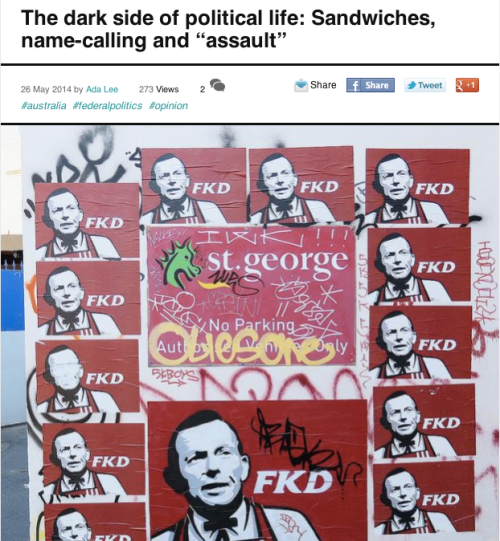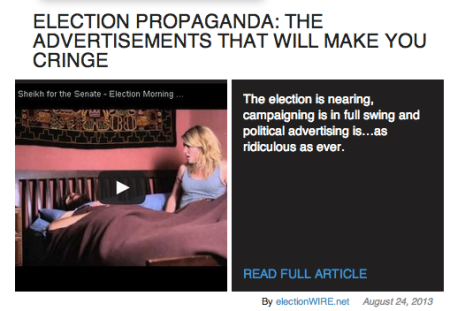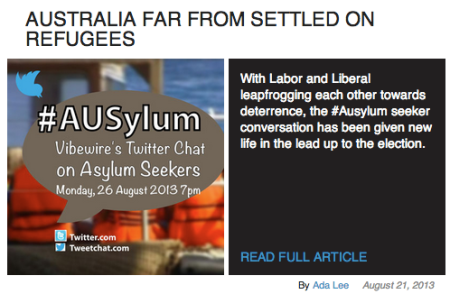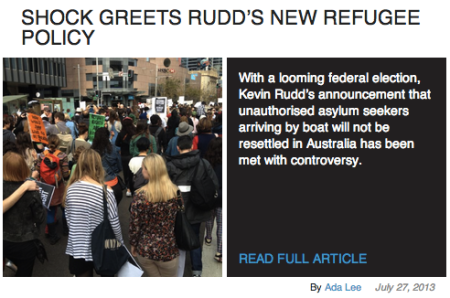Being a politician is not for the faint hearted. Whether we’re talking about student politics or an Australian federal election, those in public life are often subject to ridicule, insults and angry protests. This reality was made clear this month, when several current and former Liberal politicians were confronted and even allegedly assaulted by angry university students while visiting several uni campuses in Sydney and Melbourne.
Early last week, student protesters disrupted a lecture by former Liberal MP Sophie Mirabella at the University of Melbourne. This was predated by students yelling at Foreign Affairs Minister Julie Bishop when she visited two Sydney universities this month. Education Minister Christopher Pyne has also seen his fair share of student activism – first on a now famous episode of Q&A and then again last Thursday night, when he attended the Howard Debating Cup at the University of Sydney.
Pyne was quick to label students’ approach to Bishop as “assault”, though many dispute this. Disagreement and dissent are healthy to democracy, but as shown in the latest series of student protests against the Liberal government’s cuts to higher education, the level of acceptable dissent against politicians and other authority figures can polarise opinion across Australia.
Defending the Q&A protest
When you make promises to the public – when you are elected on those promises and when you wield enormous power over the nation’s future – your actions and your policies are justifiably scrutinised. “That politicians would become the focus of intense public scrutiny and intense emotions is to be anticipated to some extent”, said Dr Peter Chen, a politics lecturer at the University of Sydney, to Hijacked.
Dr Chen said we should recognise that politicians are people with human emotions, but that the power and responsibility they hold is exceptional. Dr Chen defended the chanting Q&A protesters and pointed to the power imbalance between students and politicians. “On the one hand, it would be good to engage in civil policy-oriented debate, and I think in general people do agree to that, but that position assumes we are in an environment where all people can participate in civil debate [equally] and I’m not sure that’s necessarily the case,” he said.
Throwing shoes and sandwiches
When your voice is ignored, when your letters are answered only with regurgitated statistics, and when forums like Q&A become more and more scripted, how far should you push to be heard? Some people draw the line further along the spectrum than others, and throughout the years, politicians have been subject to some pretty humiliating and threatening demonstrations.
During his reign as Prime Minister until 2007, John Howard had shoes – an old school form of spectator disrespect – thrown at him twice over “racist” policies and the Iraq War. Australia’s first female PM Julia Gillard also had sandwiches thrown at her during two separate school visits and she narrowly missed a flung egg in Perth. Even in New Zealand, MP John Banks was recently sprayed with a bucket of mud over charges for failing to declare high profile donations.
Dr Chen says that throwing things constitutes as violence. “Everyone should have the right to participate politically without the fear of violence, and it does no good when violence is used as a political strategy by any side of the political spectrum in a democracy,” he said.

Name-calling and ridiculing
If an average person experienced the amount of name-calling and ridiculing that politicians face in the media and on the street, people would not hesitate to call it extreme bullying.
During her time as Prime Minister, Julia Gillard was called a bitch and a witch. “Take that, you dog,” is one line shouted before a group of Greens supporters threw shoes at somebody dressed up as former PM Kevin Rudd. Last October in Melbourne, students burnt an effigy of current leader Tony Abbott outside Victorian Parliament, and it’s not unusual to see young and old Australians wearing t-shirts or holding signs that say “Fuck Tony Abbott” or “Tony Abbott eats poo”.
When we don’t know a politician, it is easy to idealise them as an ultimate hero or villain – much like the way we sometimes forget that celebrities like Kanye West or Kim Kardashian are actually real people. Some people say that putting yourself up for criticism is a price to pay for public power. But should we still take into account a politician’s emotions, the impact on their loved ones or their basic human rights?
Some people realise that politicians aren’t just talking heads on a TV screen. Georgia Hitch, a student from the University of Sydney, went to school with Kevin Rudd’s son. Kevin Rudd was mostly just the dad who showed up to his son’s tech shows or held a charity event with the school. “He was first and foremost a dad, just like the rest of our [parents],” says Hitch to Hijacked. “At the end of the day, politicians really are people with emotions,” she says of the effect of Rudd’s ousting on his family.
Like the rest of us, politicians deserve the right to feel safe from harm, to be free from persecution based on sex, race and religion and – dare I say it – to be allowed freedom of political communication (to the extent that it does not incite hatred, violence or significant harm against others).

Ineffective protest strategies
Some people say that violence, profanities and abusive slogans like “Fuck Tony Abbott” are not only crass, but that they also undermine the effectiveness of the movement because they overshadow the issues and peaceful nature of protests.
“The ambush of Julie Bishop made the protesters seem erratic and abusive and potentially undermined the cause and their motives,” says Hitch. “Considering how critical the media are being towards protesters [we] all have to think very carefully about exactly how we choose to get our message across [and not] through profanities, shoes and sandwiches.”
In a protest of thousands, it is often the small and apparently violent group that will make front page news. It is the violence, the egg and the shoe – not the issue or peaceful protesters that we remember – that are often latched onto by tabloid newspapers or those with an agenda to push.
Dr Chen says the protesters face a difficult paradox when dealing with the media. Violent protests can distort the focus of an issue, but peaceful protests like March in March are often under-reported. “While a more rambunctious style of protest may be somewhat counterproductive, it may be less counterproductive than getting no coverage at all,” he said.
Politics is not an easy job and sometimes it becomes intensely personal. While protesters are disadvantaged when challenging powerful politicians, it is still within their power to determine their personal actions and decide what kind of social movement they want to create.






